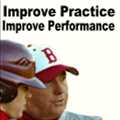Written by Ric Reeder
Tip #1: Get the Rule Book
Tip #2: Get the league practice and game schedules
Tip #3: Have a Parent Meeting
Get the Rule Book: Even if
you are a fan of the game understand its rules, get the rule book from the league when you accept a coaching position. Youth
sports often have different rules than High School, College, or Pro leagues. The rules often change according to age group
and division. Knowing how long the game periods last, the number of timeouts you have, and any mandatory playing time regulations
before the season begins permits you to plan properly for your games.
*** Bonus Tip: Set your player rotation before you go to the game. Setting it
up prior to game time allows you to plan your lineup and be sure that you meet all mandatory playing time rules. This also
permits you to focus on the game rather than wondering if Johnny or Susie has all of their time in.
Get the league practice and game schedules:
You may have some latitude in scheduling practices but there are often scheduled times for your team to practice. You may
have to ask for the practice schedule. It is up to you, your team, and the parents if you want to have practices over and
above the practices scheduled by the league. If you do, you're usually on your own to find an open spot.
Have a Parent/Player Meeting before the season starts: Parent meetings are the most important step you can take to have a successful season. Establishing
the rules and behavior expectations (of players and parents) prior to the first practice of the season is imperative. This
is the time when you review team rules, pass our practice and game schedules, solicit volunteers, and ask the parent if there
is anything special you need to know about their kids - Attention Deficit Disorder; Asthma; Needs Glasses; Known allergies;
etc. Trust me, you'll save yourself and your players a lot of grief if you find out the special circumstances ahead of time.
Other things to discuss:
Recruit Volunteers for the following positions:
1. Team Mom or Dad - the person who coordinates collections on fundraisers, concession
stand and game day snack assignments, picture day, and other miscellaneous administrative type duties
2. Score/Stats Keepers - people who may not want to service coach but who come
to the games can keep score and maintain stats for you in the stands
3. Coaching Assistants - you typically need at least one assistant, but if you
can get a couple, I'd recommend it. Having extra coaches means help with running great practices and games.
Discuss your objectives for the season.
For example:
1. Develop the skills required to play the game
2. Have fun
3. Develop teamwork and sportsmanship
4. Give positive reinforcement based on effort rather than results
Describe your expectations of the parents.
For example:
1. Be on time for practices and games
2. Volunteer when your schedule allows
3. Get involved and help your child work on their skills at home - pass the ball
with them, etc.
4. Encourage good sportsmanship. Be an example by showing positive support for
all players, coaches, and officials at every game and practice. Please cheer for your child during games, but try to refrain
from yelling instructions to them. Much of the fun is lost if their Mom or Dad is consistently yelling instructions.
5. Let the coach know if you or your child has any issues or concerns as quickly
as they arise. Problems can usually be fixed easily if I know about them.
*** Bonus Tip: Hold your Parent/Player Meeting prior to the first practice, and
away from the practice area or playing field. I prefer to use my local public library, that has meeting rooms that are free
or very low cost to use. Having the meeting in this setting will allow you to hold your parent and player attention much easier
than competing with bouncing balls, goals, and at all else may be going on.
Implementing the tips listed above will almost certainly assure you a successful
season.

